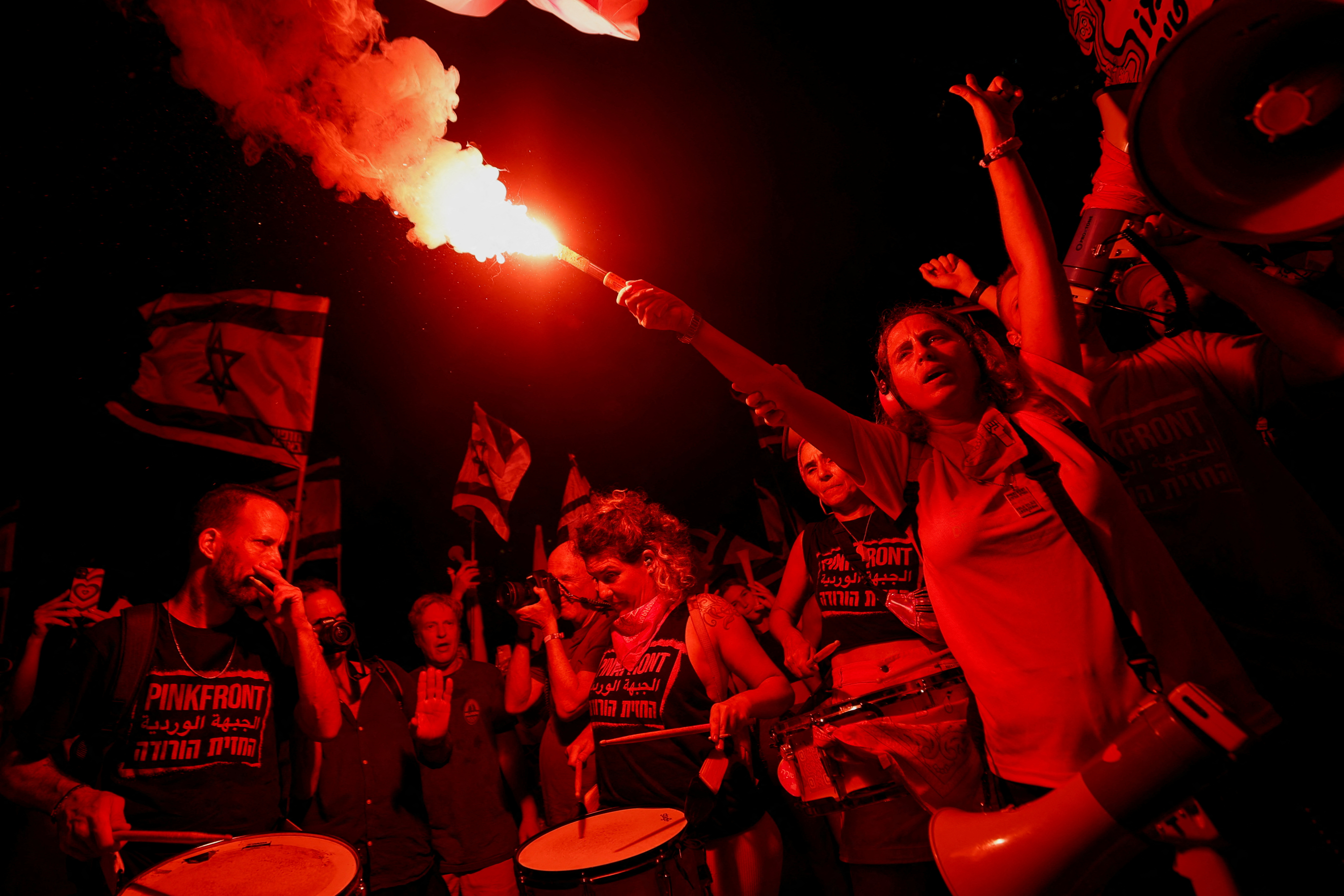
Saturday’s surprise attack by Hamas has left Israelis in shock, outraged at a government many feel failed to protect them – but analysts say the political fallout will have to wait as the army wages war in Gaza.
The attack, which Israel’s intelligence services appear to have completely missed, marked “a colossal failure”, said retired Colonel Miri Eisin, the managing director of Israel’s International Institute for Counter-Terrorism.
“Critical voices will come out, but that’s not the focus in Israel right now. We need to get through this [war], then we will start pointing fingers,” she told Al Jazeera. “It will be harsh and horrible, but it will [come] after we’ve stabilised.”
Hamas launched the unprecedented operation at dawn on Saturday, firing thousands of rockets into southern Israel, sending fighters deep into Israeli territory and abducting more than 100 Israelis.
Israel swiftly responded with air attacks on the overcrowded and besieged Gaza Strip.
Israeli air attacks in Gaza have killed more than 560 people, including 20 children. About 800 Israelis have been killed in the Hamas attack, according to media reports.
Clashes are ongoing between Hamas fighters and Israeli forces in southern Israel in the cities of Ashkelon and Sderot and at a kibbutz in Karmia.

Shocked public backs ‘dramatic’ response
Prime Minister Benjamin Netanyahu was quick to announce that Israel would “exact an immense price from the enemy” in Gaza and threatened to turn the Palestinian enclave into a “deserted island”.
Israel has placed the impoverished territory of 2.3 million people under a land, air and sea blockade since 2007 and launched repeated assaults on it to fight Hamas, which controls the Gaza Strip, and other armed groups, arguing it needs to act decisively to stop them firing rockets into Israel.
But Israeli operations have not dislodged the armed group from power or stopped the rocket fire as Palestinians have suffered most of the casualties.
The unprecedented nature of Saturday’s attack was driven home by videos of Israeli hostages and of revellers at a music festival near Gaza fleeing into the Naqab Desert after Hamas fighters attacked with paragliders, killing up to 250 people.
Julia Elad-Strenger, an assistant professor in politics at Israel’s Bar Ilan University, said the Israeli public was reeling and would unite behind a tough response.
“The great shock caused by Hamas abducting and attacking civilians in such an organised way, within Israeli territory, gives very strong legitimisation across the political spectrum for a quite dramatic military operation in Gaza,” she told Al Jazeera.
But the government also faces severe criticism, even from within, for being caught off guard.
The crisis is a particularly heavy blow to Netanyahu, who has been beleaguered by repeated political crises and corruption charges that threaten to land him in prison.
Michael Stephens, an associate fellow at the United Kingdom-based defence and security think tank Royal United Services Institute, said the attack was “politically devastating for Netanyahu”.
“This government was meant to be the one that took security seriously, and they’ve delivered nothing,” he said.
“There’s no way they come out of this looking good. It would be very, very difficult for an Israeli PM to survive this.”
A new government?
Yet Israel’s longest-sitting premier has a well-earned reputation as a great survivor, and it may be too soon to write his political obituary.
The same day as the attack, Netanyahu and his bitter rivals, opposition leaders Yair Lapid and Benny Gantz, publicly mulled the idea of forming a broad emergency government.
It would replace an administration widely seen as one of the most right-wing governments in Israel’s history, both in terms of its policies towards Palestinians and in terms of its domestic agenda – notably a controversial plan to neuter Israel’s judiciary, which plays a key role in checking executive power.
The reform plan, backed by some of Netanyahu’s most far-right coalition partners, has prompted months of mass protests by Israelis who fear it would spell an end to their democracy.
Elad-Strenger said that, were Lapid and Gantz to join the government, it could dilute or sideline its far-right members. That would in turn give Netanyahu a way to drop the judicial reforms, which have damaged his standing with voters, but still allow him to remain in power.
“Of course, this could also serve the opposition because it would push the more extreme forces out,” she said.
“All the numbers we have show that if this government falls, they won’t have another opportunity to have such a strong foothold.”

Anti-Netanyahu protests: on hold for now
That scenario may take months to materialise if there is a prolonged conflict in Gaza.
In the meantime, the anti-Netanyahu protests are on hold. Organisers cancelled Saturday evening’s protests, citing the security situation and voicing support for the army.
Elad-Strenger said some people had already started trading accusations with the right accusing the protest movement of creating instability and leaving the military ill-prepared, while the left blamed Netanyahu and his ministers’ provocations against Palestinians.
But Eisin said politicians and protesters alike had largely pressed pause on the “blame game”.
“We need to be together to fight,” she said. “All has been put aside. Many of the protesters are reservists [in the armed forces]. They all went when they were called up. Nobody said they’re not going.”
However, there appears to be a high likelihood that once the situation calms down, the protests will return.
“Israelis have a huge amount of anger at the government for letting them down. There’s a sense that state has been withering away from within under Netanyahu’s watch,” Stephens said.
“This war will happen, Israelis will unite. But you can already tell that there’s a desire for retribution, that something is very rotten in the state and all the way through the system, and there will be a price to be paid politically.”







